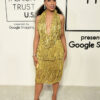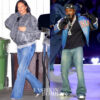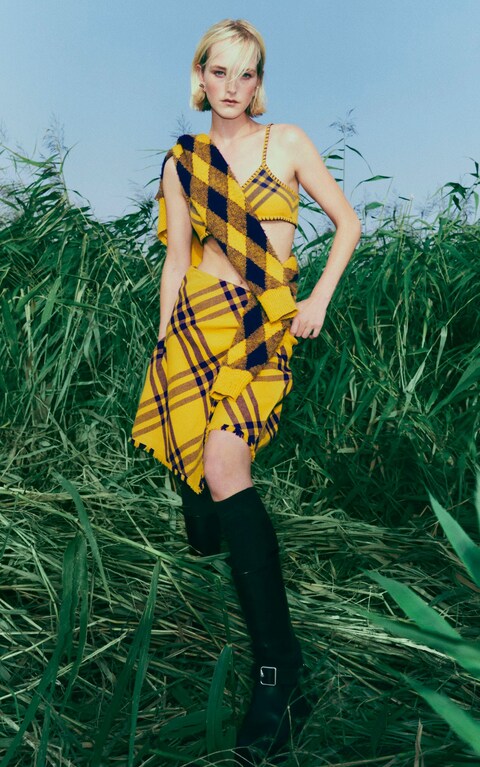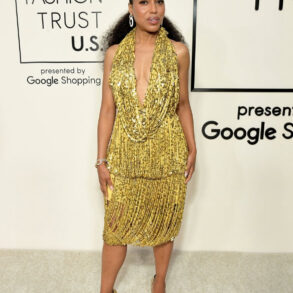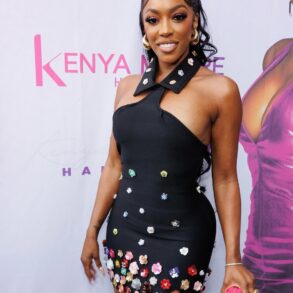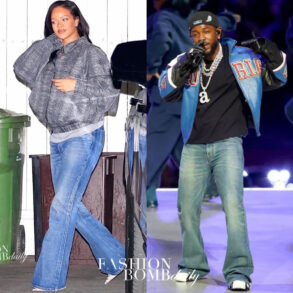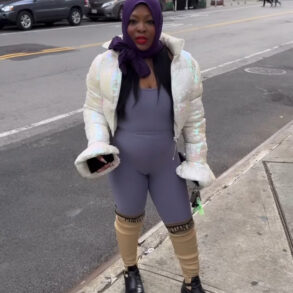February 2023. A cold, dark wintry evening and a large black limousine containing Anna Wintour and Baz Luhrmann is circling a housing estate in south London. So are scores of other limos. Inside a black tent, several hundred fashion VIPs are finding their way to seats around a figure-of-eight catwalk.
The benches are tantalisingly draped with Burberry check blankets, one for every two or three pairs of knees. It’s going to be one of those shows where there’s a futile scramble to grab a blanket, or one of the matching hot-water bottles (complete with instructions on how and when to use them, for those from balmier climes) to take home while trying to look blasé.
That would be the good scenario.
The bad option would be nobody bothering to pick up one of the blue-checked mementos (a strikingly cheery cobalt that’s new for Burberry and has since become one of the brand’s signature colours) because the show’s a dud. And Anna and Baz not finding the venue and getting caught in an eternal loop of doom. Of course they do find it, because anyone who counts in the fashion industry, or thinks they count, is present.
Jean Campbell models Burberry’s fresh new designs from creative director Daniel Lee. For full outfit and shoot details, scroll to bottom
Credit: Philip Messmann
What’s really at stake here is a fight for reputational relevancy, with a possible redemption story thrown in for good measure. Burberry, once a beloved brand, still huge, still holder of two precious royal warrants, but heavily reliant on selling its checked accessories in duty-free to bolster its business, has been tossed around more than other luxury brands in the turbulent waters of Covid-19 and its fallout.
Christopher Bailey departed in 2018, and his successor, Riccardo Tisci, who marked a career high at Givenchy and who succeeded Bailey, never quite clicked in his role there. Tisci didn’t seem to have his heart in the job, and despite his protestations of loving British culture, never found his way beyond national clichés.
Burberry’s latest CEO, Jonathan Akeroyd has a lot riding on his new replacement. Jodie Comer, Selma Blair, Naomi Campbell, Rosie Huntington-Whiteley, Jason Statham, Skepta, Bianca Jagger and Vanessa Redgrave are snuggling under their blankets. You could slash the tension in the room with a Burberry Prorsum knight’s sword.
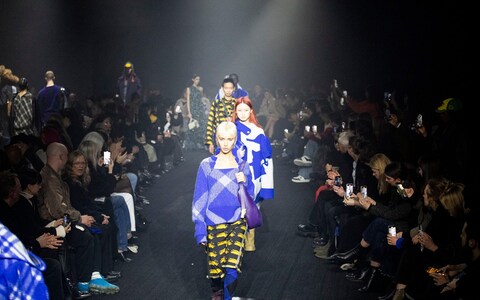

Iris Law leads the pack wearing Burberry’s cobalt blue at London Fashion Week in February 2023
‘The pressure was intense,’ recalls Daniel Lee in his soft Bradford accent (think Alan Bennett in blue football strip, but with longer vowels and a transatlantic overlay that turns Ts into Ds, so Bottega becomes bodega).
Intense is an understatement. We’re sitting at a table in a light, airy studio in a Burberry’s sleek 127,000sq ft HQ near Scotland Yard. It’s early in July and he’s just put out his first resort line. It’s his second Burberry collection – presented, like most resort lines, not on a catwalk but via personal appointments with reviewers and retailers.
If that first show in February saw Lee planting a flag on fresh soil – one where bold colour, humour and an instinct for covetable luxury must-haves can thrive – the first resort line saw him refining Burberry’s tailoring, playing with its checked heritage and a score of witty details that look set to become key identifiers in the absence of heavy logos. This won’t be one of those brands that do a dramatic volte-face each season, as Marc Jacobs famously does.
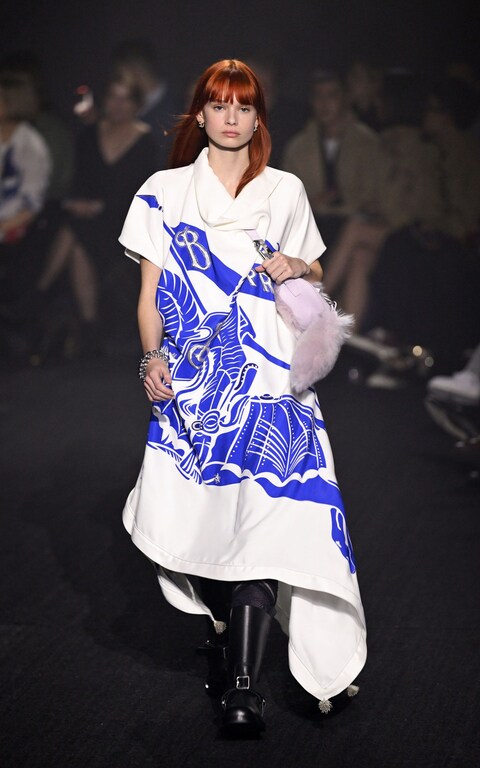

The Prorsum Knight is now back in the spotlight
Credit: Getty
‘There isn’t time to do that any more,’ says Lee. Not that it troubles him. ‘I’m someone who finds their best work through the process as opposed to thinking it all out at the beginning. Some of my most successful pieces have come about by happy accident.’
He has clearly already put in a huge amount of work during the brief time he’s been at Burberry, but, a few months on from that first show, he seems remarkably relaxed. He’s learnt to tune out a lot of the background noise and says he avoids going on social media because he knows ‘that for some reason, maybe because I’m quite private, that there’s a lot of stuff about me out there’.
Maybe because he’s back in London, living near the Arsenal football ground (he’s a huge football fan and used to support Bradford City but has no particular allegiance these days) but also not far from Sadler’s Wells (his other big love is ballet, and the venue often holds seats for him), that he already seems at home at Burberry. That’s it for leisure time, he says: football, ballet and the gym, where he does weights, Pilates… this will surprise those who had him down as a party animal, but maybe it has to be like that when you’ve everything to prove.
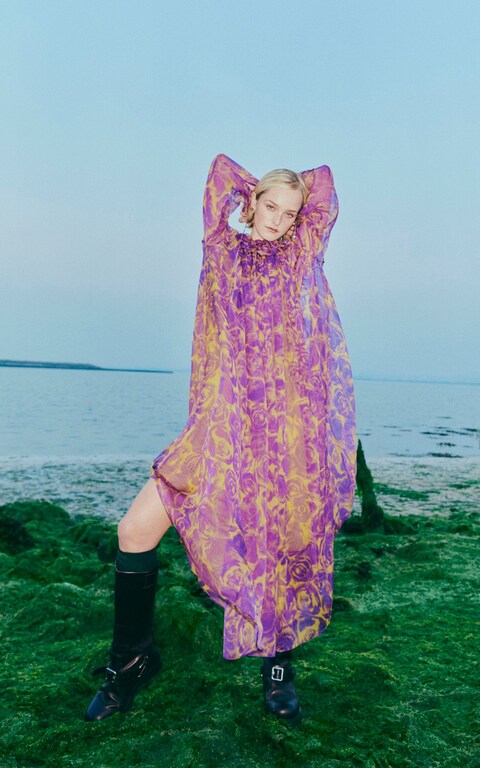

Armstrong: ‘[Lee] has clearly already put in a huge amount of work during the brief time he’s been at Burberry’
Credit: Philip Messmann
It’s all so different from his first few months at Bottega Veneta in Milan, where he arrived, virtually unknown, aged 32, in July 2018. With Italy closed for most of August, there wasn’t time to design a whole catwalk show before Milan Fashion Week in September. ‘We needed a bag to shoot the campaign,’ he says.
Inspired by a Bottega clutch Lauren Hutton carries in American Gigolo, the 1980 film that the late Louise Wilson, his charismatic tutor at Central Saint Martins, encouraged her students to watch, he blew up its proportions, redesigned the clasp, introduced new colours and, against all expectations (no one was selling clutches), had a huge, crazy hit on his hands. A few months later he debuted the Padded Cassette, then the Puddle Boots, the Chain Pouch… in short order, Bottega became the hottest label in the world, a feat all the more remarkable given Lee had never specialised in accessories before.
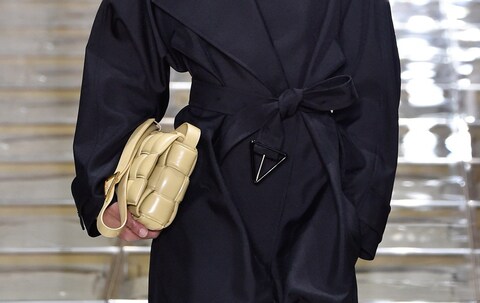

Bottega Veneta: The Padded Cassette
Credit: Getty
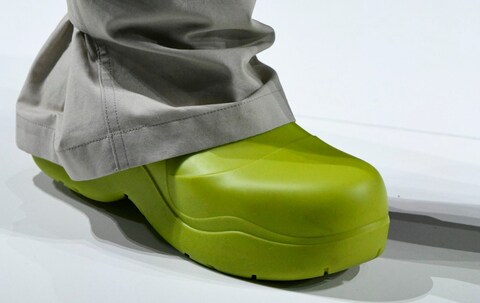

Bottega Veneta: The Puddle Boots
Credit: Getty
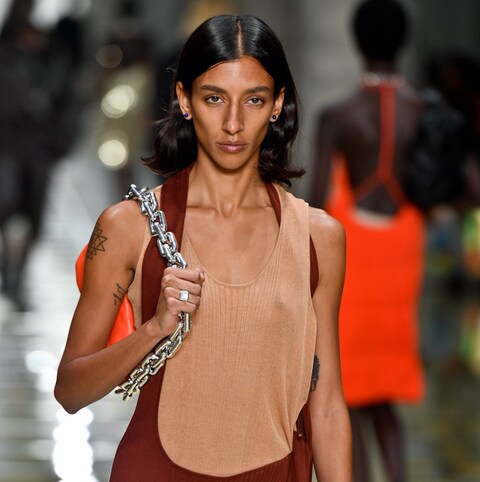

Bottega Veneta: the Chain Pouch
Credit: Getty
‘I suppose I brought a naivety to it that made everything seem quite spontaneous and different,’ he says modestly. After a lonely start, Lee began to feel settled(ish) in Milan, which had initially seemed deathly quiet after his years in London, New York and Paris. He would laugh when his cousins turned up at the Milan show wearing Bottega fakes they’d found in Primark: ‘I’m from up north. We’re good at humour.’
The path ahead looked smooth. Within a year he’d set a record for awards, bagging four major trophies at the Fashion Awards in London. He survived Covid in a locked-down, closed-in Milan, although in hindsight, he calls that time ‘isolating’. Then in 2021, to widespread shock, he left – ‘by mutual agreement’, he tells me. But who does that? Who leaves a brand three years into a stellar adventure? Speculation ran wild and dark. He disappeared, and the first time he resurfaced publicly was after that February Burberry show.
Surrounded by journalists in a claustrophobic corner backstage, his pale skin flushed scarlet, Lee must have wondered whether history wasn’t about to repeat itself. But although he’s shy and shuns most publicity, he says the mayhem backstage at Burberry felt different from the hysteria at Bottega.
‘When I started at Bottega, all I could do was try to block out all the attention, otherwise it would have been overwhelming. I really didn’t have a trusted team at the start. That takes years to build. It was like trying to fly a plane and build it at the same time. It was really, really exposing because there was no one to guide you. You just had your own intuition. Fortunately, I now work with people I really respect and admire and trust [some of whom came with him from Bottega] so it all feels more shared – the good and the bad.’
In any market, Burberry is a significant player. But in the UK, its hold is emotional as well: it’s far more than a fashion label that has been worn by everyone from Audrey Hepburn and Humphrey Bogart, Eddie Redmayne to Kate Moss. Lee understands that. ‘It’s an honour,’ he says, making all the right noises about wanting to showcase British craft and bringing more of the production back to the UK.
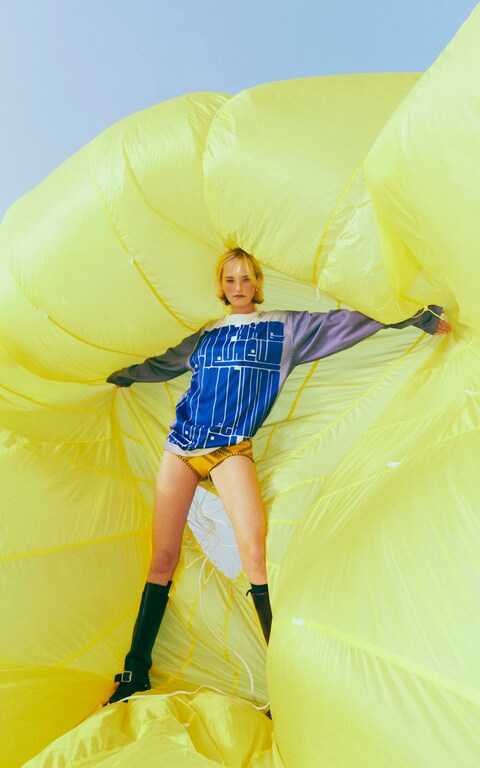

‘In any market, Burberry is a significant player. But in the UK, its hold is emotional as well,’ writes Armstrong
Credit: Philip Messmann
Those trench coats, first introduced by Thomas Burberry after he invented waterproof gabardine, in 1879, are totemic. They were the outerwear of choice for the explorer Ernest Shackleton and for serving officers in the Boer, First and Second World Wars. Burberry is as British as Daddies Sauce, hot-water bottles and Adele (whose first splurge, once she had some money, included a Burberry trench).
The huge draw for Lee is that while Burberry recently posted revenue up by 10 per cent to £3.09 billion on the previous year, it never had an illustrious accessories wing – which is extraordinary for a brand that size. No wonder Akeroyd wanted Lee, who has an instinct for what needs to be done. ‘Daytime luxury,’ he calls it. ‘It has to look strong and outdoorsy but also feel warm, because Burberry’s all about warmth.’
If, in February, people were expecting a press-and-play of Lee’s sumptuous Bottega turn, they were in for a shock. At Burberry, the accessories, like the clothes, are more functional than at Bottega. As Lee says, ‘If you think about the people who wore Burberry before it was a fashion brand – the explorers, the soldiers, Thomas Burberry himself – then it only makes sense for the fashion pieces to work. If it’s a tracker boot, you need to be able to actually go hiking in it.’
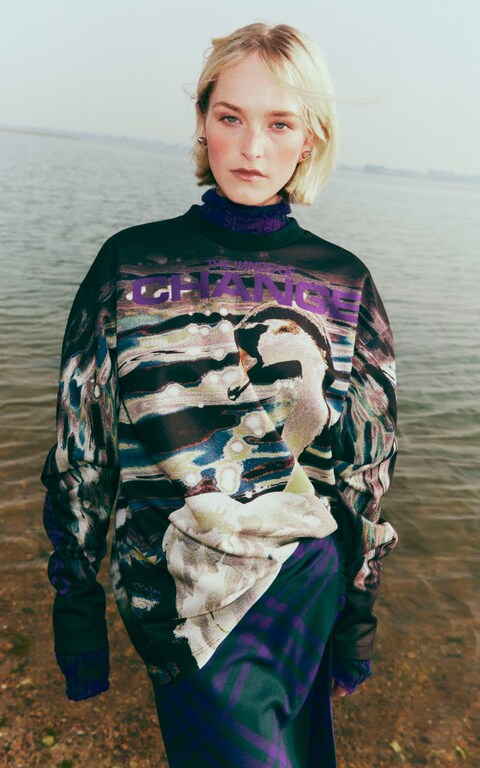

Print top, £690, turtleneck and wool-blend kilt, £1,490
Credit: Philip Messmann
While Bottega was all about leather as soft and springy as a soufflé, Lee understood that a utilitarian grainy leather you can throw around would be part of Burberry’s core vocabulary. He knows all the touchstones that make a bag or boots bypass the rational part of a consumer’s cortex.
Exaggerated proportions, slick fastenings, leather that, rugged or not, feels almost creamy to the touch… from the first look on that February Burberry catwalk (a category-defying bottle-green trench with fake-fur collar that looked both utilitarian and deeply plush, and a new squashy shoulder bag with sheepskin trim, the Knight), it was clear he’d been working round the clock with his 70-strong team to reinvigorate this brand.
Among the new bags were the Knight, the Rose clutch (a whorl of petals), and the Shield – deeply British names that reconnect Burberry with the Prorsum knight, now back in the spotlight. The TB logo, reworked by Tisci, will be edged out, and instead there will be more subtle brand markers, such as the beautifully made hardware.
‘Burberry should appeal to everyone, from the street to the Royal family. It has that unique breadth as a brand that means you can push both ways. It’s legitimate to have lower and luxury prices.’ He’d love to see the Princess of Wales in a trench and one of the new bags. ‘Make mental note to invite her to the next show,’ he says, laughing.
Lee’s introduction to the world of fashion has a fairy-tale quality. He came from another world. Bradford in West Yorkshire is a gritty ‘working town’, as he puts it, famous in the past for textiles and a football team. In the 1850s, two thirds of Britain’s wool was processed there. By the time Lee was born, in 1986, its glory days as a mill town were long gone. But Lee’s childhood was happy and secure in the city’s leafy suburbs.
His father is a mechanic, his mother worked in an office, and his school was enlightened and academically sound. With zero connections to fashion (his brother became a plumber, his sister a nurse), if it hadn’t been for the arrival of a certain department store in Leeds, Bradford’s posher cousin 10 miles down the road, he might never have found his way into a fashion career. It’s almost 30 years since Harvey Nichols opened its branch in Leeds, but Lee still remembers the visceral impact of walking through its doors. ‘The clothes, the bags – I’d never seen or felt anything like that before.’
At Central Saint Martins, he and his cohort ‘were obsessed with McQueen, Westwood, Galliano. It was all about the tailoring. It’s quite mathematical in a way, and I like that. My family’s very practical.’ After internships at Martin Margiela and Balenciaga under Nicolas Ghesquière (Lee’s CV is almost baroquely up-market), his first paid gig was at Donna Karan. ‘She’s hilarious, full of life, politically so incorrect,’ he recalls.
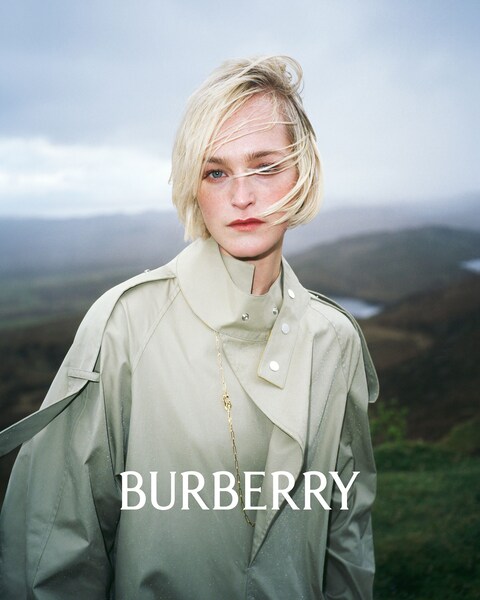

Burberry’s Winter 2023 campaign
Credit: Photograph by Tyrone Lebon, courtesy of Burberry
Then came Céline with Phoebe Philo, where he really had his mind blown by the feel of uber luxury: ‘The cashmere at Céline was something else. I don’t think I’d experienced anything like that. That was really Phoebe’s thing… she’s quite bourgeois underneath it all.’
Wilson, Karan, Philo… there’s a pattern of strong women in his life, including his mother and sister, who attend his shows and wear his designs. Philo showed him the importance of shielding your creative team from the pressures of the job. ‘There were 50 of us working for her in London,’ he says. ‘And I think we never really felt the heat the way she did. By physically removing the team from Paris to London, Phoebe gave us some space to be creatively free. She also said, “If you give them a hit bag, they’ll leave you alone.”’
Across women’s, men’s, accessories and childrenswear, Lee now has his own team to protect, and it’s still tough. But a measure of his own evolution is that, while it took seven months to unveil a first catwalk collection at Bottega, he produced one within three months of arriving at Burberry.
Inevitably, some critics were unimpressed, but the consensus is that he made a hugely positive start, laying the foundations of a house that will have many more substantial floors than was previously the case at Burberry. But to do that, he needs to keep producing hits. Does he know when he has one on his hands? ‘Never. All you know is that if you can create something that isn’t out there, you have a chance.’
That kind of puzzle could keep you up at night. ‘It’s not easy.’ While he’s made it clear he’s no clairvoyant, he thinks the Shield, a deceptively simple bucket with a sloping side, could be a success. ‘It’s a good price. It comes in beautiful colours. It’s functional and there’s something playful and joyful about it. It reminds me of the Cassettes we did with Bottega, which were the younger, entry ones.’ He feels quite confident about the Knight bag too. ‘It’s what you wear with a trench. It defines daytime luxury.’
I ask him what he thinks his strengths are as a designer and say he’s not allowed to say he’s a perfectionist. He laughs. ‘I wish I was. Phoebe always said if you’re happy with 80 per cent of what you show, you’re doing well. So far, so happy.’
View more from the shoot…
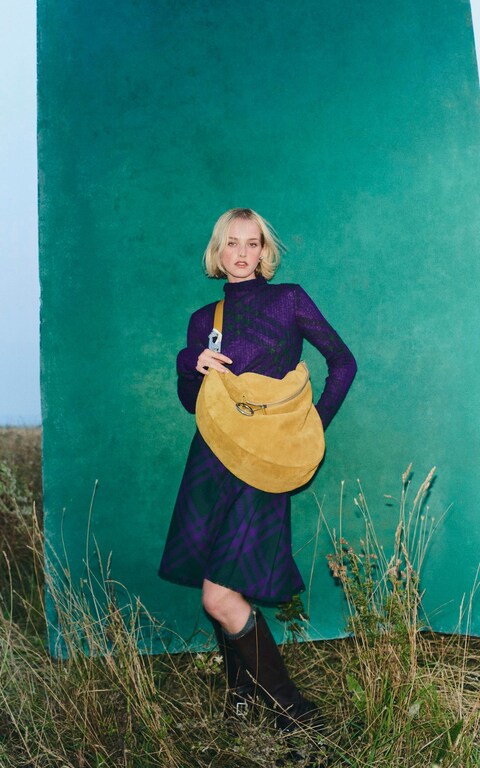

Mohair-wool turtleneck, £1,590, wool-blend kilt, £1,490, leather boots, £1,690, suede bag, price on request, and silver stud earrings, £490, socks, stylist’s own
Credit: Philip Messmann
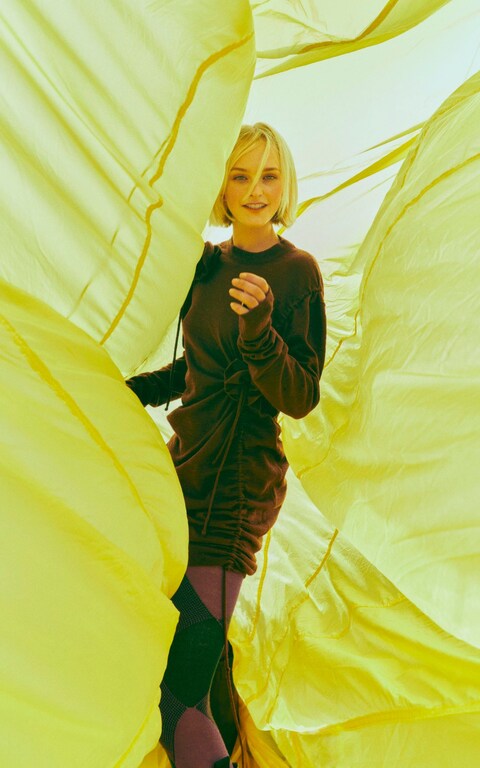

Wool dress, £1,790, and wool tights, £490
Credit: Philip Messmann
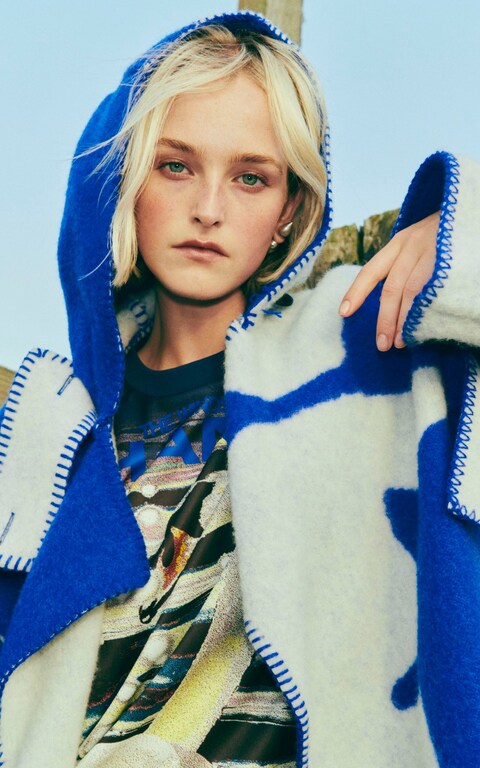

Wool coat, £3,990
Credit: Philip Messmann
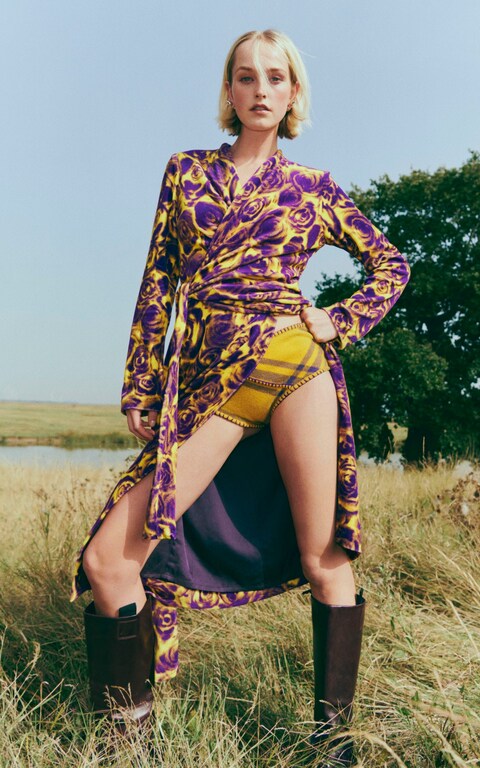

Velour dress, £2,890, and wool briefs, £690
Credit: Philip Messmann
Photographs by Philip Messmann. Styling by Tona Stell. Portrait by Tyrone Lebon. Model: Jean Campbell at Perspective Management. Hair: Yoshitaka Miyazaki, using Oribe. Make-up: Celia Evans, using Isamaya Beauty. Stylist’s assistant: Alice Dench. Production: Hen House.
Lead image outfit details: Wool bra, price on request, wool sweater (worn over shoulder), £1,290, and wool kilt £1,490, all Burberry.
This post was originally published on this site be sure to check out more of their content.

